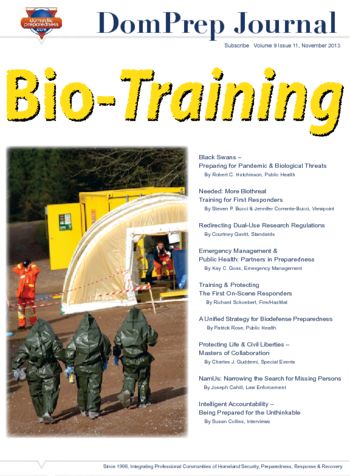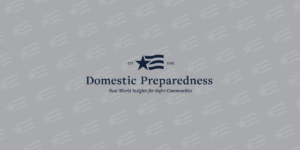

Redirecting Dual-Use Research Regulations
Courtney Gavitt
November 20, 2013
Life science research benefits society in many ways, but also creates certain risks – particularly when that research falls into the wrong hands, either deliberately or unintentionally. Clearly defined rules and regulations governing the results of such dual-use research could help keep scientific research focused on less dangerous and more beneficial results.

Emergency Management & Public Health: Partners in Preparedness
Kay C. Goss
November 20, 2013
Despite the fact that emergency managers and their public health partners have much in common, they often do not collaborate effectively in responding to mass-casualty emergencies. By identifying existing similarities and finding more common ground, the future reparedness and response efforts of both groups will be even more successful.

A Unified Strategy for Biodefense Preparedness
Patrick P. Rose
November 13, 2013
Regardless of what many experts perceive as the likelihood of a biological attack, continuing
improvements in U.S. public health preparedness programs are necessary to ensure more effective response
operations and save countless lives. A cooperative approach to biodefense planning should include an
expansion of the nation’s existing arsenal of medical countermeasures and the development and production
of additional vaccines.

Intelligent Accountability – Being Prepared for the Unthinkable
Susan Collins
November 13, 2013
The unthinkable can happen at any time, and in any place. Being able to track and credential first
responders in a timely manner against the unseen perils in today’s dangerous world can save many lives.
This podcast interview provides important insights on the effective use and training of intelligent
accountability systems.

Needed: More Biothreat Training for First Responders
Steven P. Bucci and Jennifer Corrente-Bucci
November 13, 2013
Biological weapons are the most significant threat the United States now faces. Identifying the
signs and symptoms early is the best method of defending against such weapons, but U.S. military
personnel are not yet properly equipped and trained to identify and prevent the spread of such threats.

Black Swans – Preparing for Pandemic & Biological Threats
Robert C. Hutchinson
November 6, 2013
The first step in preparing for a “Black Swan” event is to confirm that it actually exists. Once that is done, it is important to recognize its potential impact, implement the plans and strategies needed, and understand the roles played by all stakeholders involved.

NamUs: Narrowing the Search for Missing Persons
Joseph Cahill
November 6, 2013
Law enforcement officers, medical examiners, and coroners are now able to accumulate more data more quickly in their efforts to solve missing-person cases. Moreover, the National Missing and Unidentified Persons System not only provides a wealth of helpful information to public agencies but also empowers families to help locate their loved ones.

Protecting Life & Civil Liberties – Masters of Collaboration
Charles J. Guddemi
November 4, 2013
This exclusive behind-the-scenes look at the United States Park Police (USPP) highlights the special event planning process, from the application form to the after-action report. The men and women of the USPP protect First Amendment rights, ensure the safety and security of visitors, and provide daily law enforcement protection. From “Park Watchmen” to “Masters of Collaboration,” the uniformed men and women of the USPP have a legacy worth modeling.

